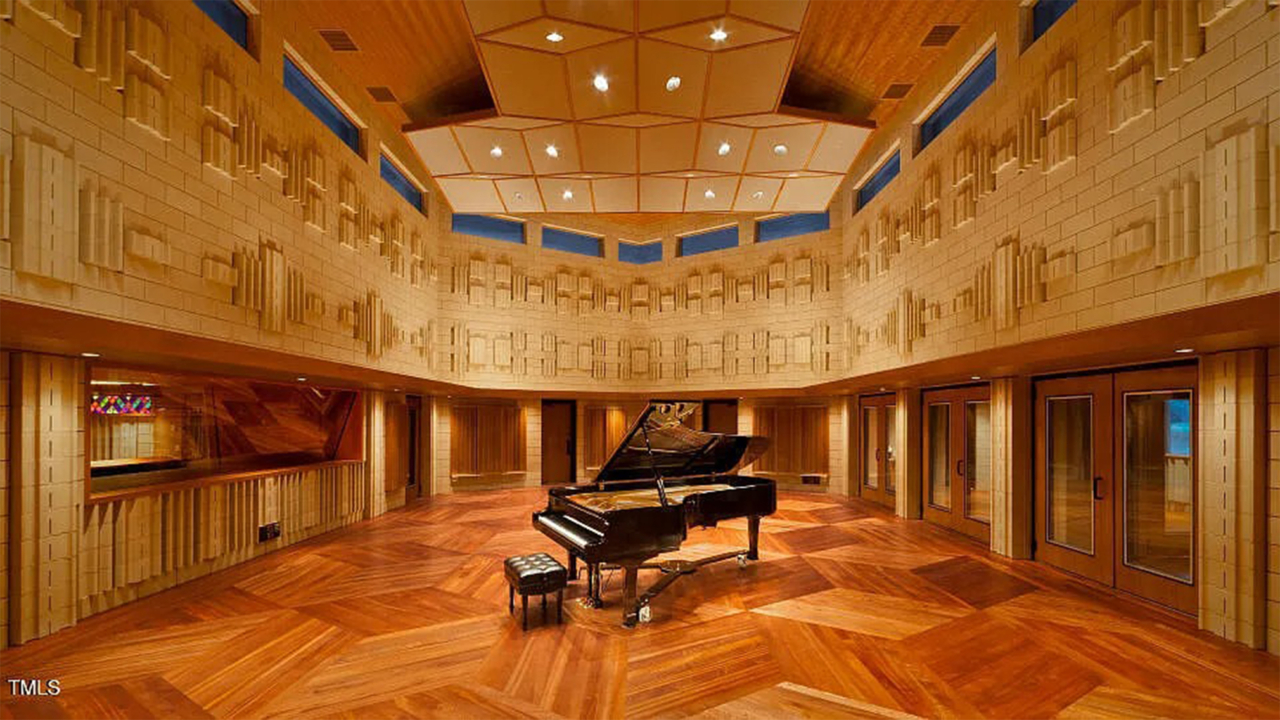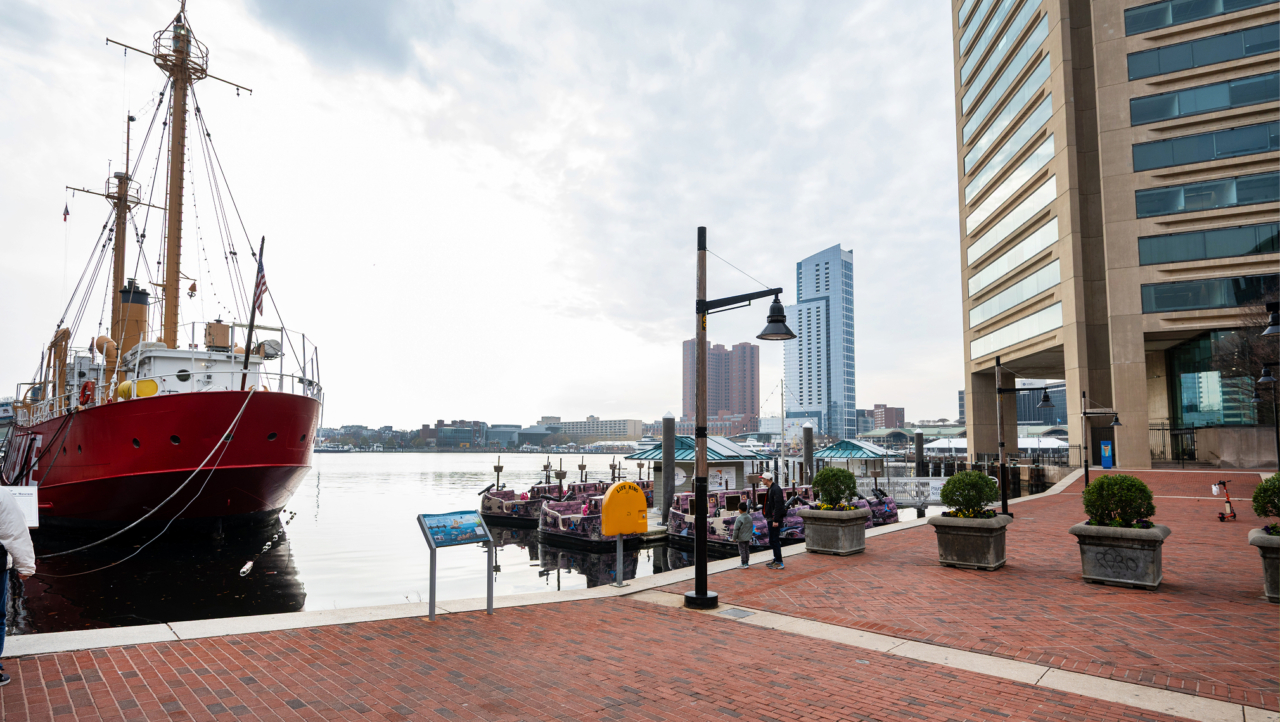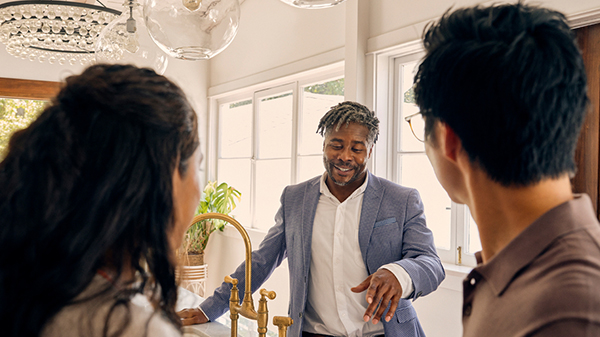Open House Etiquette and Rules for Buyers
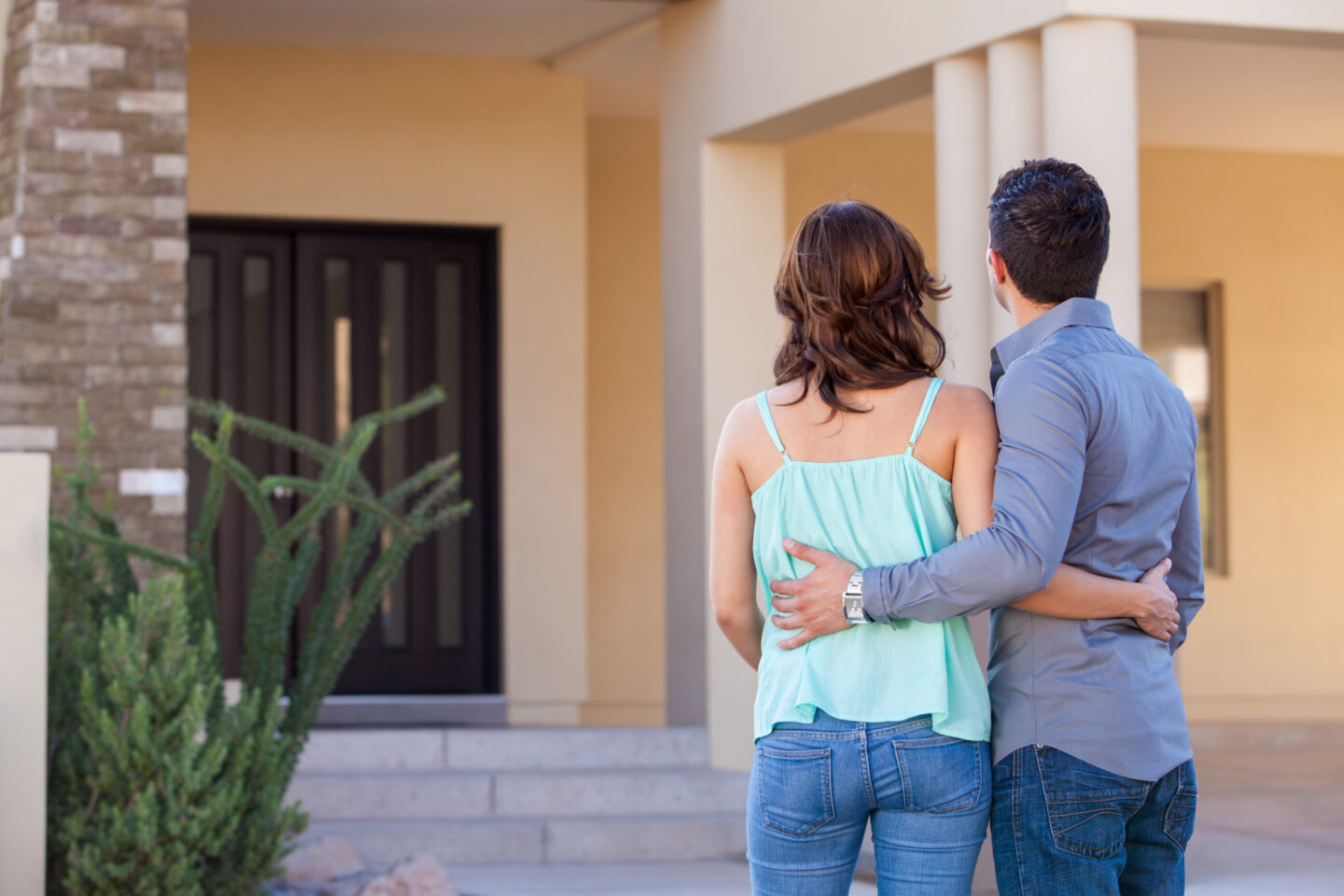

Written by Jennifer Lyons on September 17, 2025
Reviewed by Orphe Divounguy and Jeff Rankin, Edited by Alycia Lucio
Open houses are a staple of the homebuying experience, offering a no-pressure way to tour properties, get a feel for the market, and — if you’re serious about buying — decide if a home could be your next address. In fact, the typical buyer, according to the 2023 Zillow Housing Trends Report, attends one open house, goes on two private tours, and takes one virtual tour before making a decision. While most buyers still prioritize private showings (only 11% skip them entirely) open houses provide valuable insight for many.
Among those who forgo private tours, 22% attend at least one open house, and 29% opt for a virtual tour instead. Overall, nearly 50% of buyers say they visited at least one open house during their search, and 43% found those visits “very” or “extremely” helpful in determining whether a home was the right fit.
While anyone can technically walk through an open house, there are unspoken rules and expectations every buyer should know. From what to wear to what to say (and not say), here’s everything you need to know about open house etiquette.
What is an open house?
An open house is a scheduled event where potential buyers can walk through a home for sale with no appointment or advance notice required. Typically held on weekends, these events are hosted by the seller’s listing agent or, in the case of a for-sale-by-owner (FSBO) property, by the homeowner themselves. Most open houses run for a few hours in the late morning or afternoon, giving buyers time to explore at their own pace.
Why open houses matter for buyers
Attending an open house can be more than just casual browsing. Here’s why they’re worth your time:
- Skip the scheduling stress: Open houses let you look around without making an appointment. Just stop by during the posted hours and walk through at your own pace.
- See the interest level: The number of people in attendance can give you a sense of how much competition you’ll have. You can use this knowledge to determine how much to offer and when to make the offer.
- Compare home values: Checking out several homes helps you understand what your budget gets you in the area and what features are typical at different prices.
- Figure out your priorities: Seeing homes in person often changes your list of must-haves. You might realize an extra bedroom isn’t as important as you thought, or that a big yard isn’t as useful for your lifestyle. Explore tips for house hunting and start shaping your list.
An open house gives you a low-pressure way to evaluate a property, get a feel for the neighborhood, and decide whether it’s worth taking the next step toward making it yours.
Who hosts an open house?
The person welcoming you at the door can vary depending on how the home is being sold. Typically, you’ll meet one of the following:
- The listing agent: Hired to sell the property, this agent knows the home inside and out. They can answer questions about its features, history, and the surrounding neighborhood.
- An associate or team member: If the primary listing agent can’t attend, they might send another agent from their team or office. These hosts usually know the local market well, though they may not be as familiar with the specific home.
- The homeowner: For a for-sale-by-owner (FSBO) property, the seller themselves will host the open house. They’ll be the ultimate source for details about the home but may not have deep insight into market conditions or pricing trends.
No matter who’s hosting, don’t hesitate to ask questions; they’re there to help you understand the home and the buying process.
How do open houses work?
Not every seller or agent chooses to host an open house, but when they do, the process is usually straightforward. Here’s how it typically comes together:
- Scheduling the event: The seller and their agent choose a date and time, usually a weekend afternoon when most buyers are free.
- Spreading the word: The agent lists the open house on the local MLS and promotes it through online listings, social media, print ads, and neighborhood signs.
- Getting the home ready: From setting out refreshments and printing flyers to adding welcoming touches like soft music or fresh flowers, the agent ensures the space feels inviting. (Yes, the cookies are fair game!)
- Hosting the tour: The agent greets visitors, answers questions about the home and neighborhood, and keeps the event organized so everyone can look around comfortably.
- The buyer’s role: Guests are expected to follow house rules — like removing shoes, respecting the property, and asking permission before taking photos or video. Many buyers take notes to remember key details.
- What happens next: If you’re interested after the tour, you’ll connect with your own agent to schedule a private showing or, in competitive markets, make an offer right away.
Ready to start finding homes you can tour in person? Connect with a Zillow partner agent to explore open houses and take your first step toward making an offer.
How to prepare for an open house
Sometimes you stumble across an open house while out for coffee. Other times, it’s part of a focused weekend mission to find your next home. If you’re actively house hunting, a little prep can make each visit far more productive.
Research the market beforehand
Before stepping through the front door, take time to understand how each home compares to others nearby. Is the asking price competitive for the neighborhood? Has the property been sitting on the market longer than usual, or did it recently fall out of contract? Are there visible defects or a crowd of other interested buyers? Knowing these details will help you walk in with realistic expectations and questions.
Keep an open mind
The perfect home may need a little TLC. Keeping an open mind — especially if you’re working within a tight budget or targeting a hot neighborhood, can help you determine if the home fits your everyday needs. Use open houses to gauge a property’s true condition and potential. It’s also the perfect time to ask practical questions, like which walls are load-bearing or what local renovation rules might apply.
What to wear to an open house
First impressions count, even if you’re just touring homes. Dressing appropriately shows sellers and agents that you’re serious about the process and respectful of the space, without looking like you’re trying too hard. Aim for a smart casual look:
- Choose clean, well-fitting jeans or chinos paired with a button-down shirt, blouse, or neat sweater.
- Finish the look with comfortable but polished shoes, like loafers, flats, or clean sneakers.
- Dress in layers so you’re comfortable moving between properties, especially in changing weather.
Skip the gym clothes, flip-flops, shorts, or flashy accessories. Looking put-together helps you feel confident, makes a positive impression, and keeps the focus where it belongs: on finding your potential new home.
Open house tips for buyers
Use these open house tips to get the most out of every walkthrough:
Do
- Take off your shoes or wear booties if requested.
- Greet the host and provide your name.
- Sign in if necessary or requested (this is a safety issue for the seller and their agent).
- Take notes on your phone about your likes, dislikes and follow-up questions.
- Ask if you can capture a video (if the listing doesn't already include a video).
- Respect other buyers and guests.
- Wait for others to exit a room before you enter.
- Provide feedback if requested.
- Thank the person hosting the event.
Don't
- Refuse to comply with an agent or homeowner's house rules.
- Criticize the home or the owner's style.
- Listen in on other visitors' conversations.
- Touch the owner's belongings.
- Let kids run around without supervision.
- Bring food or beverages in (except water).
- Reveal information that would compromise your negotiating power, like your budget or level of interest in the home.
- Bring pets.
How to find open houses on Zillow
You want to tour homes that fit your budget, location, and wish list. Zillow’s home search tool makes it easy to zero in on the right options — just apply the “Must have open houses” filter under “More" dropdown along with your other search criteria, like price, bedrooms, bathrooms, and square footage. This way, every home you find is one that offers an open house.
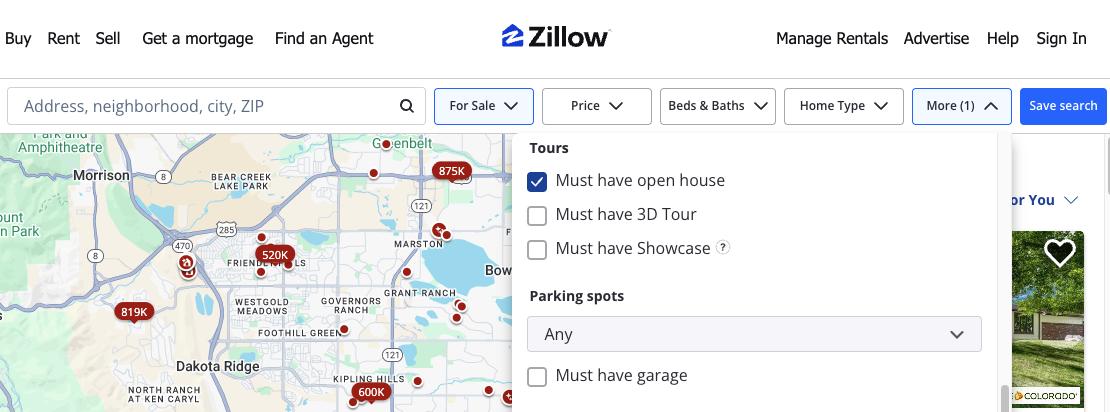
What to do at an open house
You’ve done your research, mapped out your route, and found the listings worth touring. Now it’s time to make the most of your visit. Whenever you attend an open house, put yourself in the seller's shoes; you're letting a bunch of strangers walk through your home while you're not there. While every seller wants their open house to net a buyer, they also want to keep their home safe and their furnishings free of damage.
Ask the right questions
An open house is your best chance to get details you won’t find in the listing. Don’t hesitate to ask the hosting agent about:
- HOA restrictions (learn more about HOA fees here)
- Whether the seller has filed a property tax appeal
- Any recent renovations or repairs
If you’re not already working with a buyer’s agent and decide the house isn’t a fit, this is also a chance to see if the hosting agent could be a good partner for your home search as many agents represent both buyers and sellers.
Be honest and transparent
If another agent (not the listing agent) is hosting, they’re likely hoping to connect with new clients. If you’re already working with an agent, or just browsing without serious intent, let them know upfront. It avoids confusion and keeps things professional.
Look beyond the staging
Homes often look flawless in online photos, so use your time in person to look deeper. Keep an eye out for:
- Window issues: Flaking paint, condensation, or misaligned frames
- Water damage: Warped baseboards, ceiling stains, or musty odors
- Foundation concerns: Cracks in drywall or ceilings
- Functionality: Open cabinets, doors, and drawers, and run faucets to check water pressure
- Renovation needs: Floors, fixtures, or repainting projects that could add to your overall investment
Walking through with a critical eye will help you determine if the home is worth a second showing or a place on your short list.
Ready to find your perfect home?
From learning the basics of open house rules to dressing the part and knowing what to look for, these tips can help you make every tour count. When you’re ready to move from browsing to buying, connect with a Zillow partner agent to guide you through your next steps and make the process seamless.
A local agent can help you stay competitive on a budget.
They’ll help you get an edge without stretching your finances.
Talk with a local agent